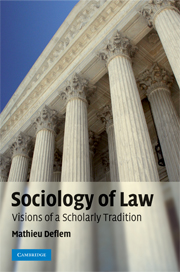Book contents
- Frontmatter
- Contents
- Preface and acknowledgements
- Introduction: sociology, society, law
- Part I Theoretical foundations of the sociology of law
- Part II Development and variations of the sociology of law
- Part III Sociological dimensions of law
- 7 Law and economy: the regulation of the market
- 8 Law and politics: the role of democratic law
- 9 Law and integration: the legal profession
- 10 Law and culture: the balance of values through norms
- Part IV Special problems of law
- Conclusion: Visions of the sociology of law
- Bibliography
- Index
10 - Law and culture: the balance of values through norms
Published online by Cambridge University Press: 05 June 2012
- Frontmatter
- Contents
- Preface and acknowledgements
- Introduction: sociology, society, law
- Part I Theoretical foundations of the sociology of law
- Part II Development and variations of the sociology of law
- Part III Sociological dimensions of law
- 7 Law and economy: the regulation of the market
- 8 Law and politics: the role of democratic law
- 9 Law and integration: the legal profession
- 10 Law and culture: the balance of values through norms
- Part IV Special problems of law
- Conclusion: Visions of the sociology of law
- Bibliography
- Index
Summary
With the rise of capitalism and democracy, modern societies have not only differentiated relatively autonomous economic and political systems, they are further marked by a differentiation of a cultural system of values and an integrative system of norms. Values are conceptions about desirable ways of life, whereas norms are sanctionable standards of conduct. Values are oriented at guiding actions among individuals or within groups (through socialization), while norms are oriented at regulating interactions between individuals or across groups (in view of integration). Durkheim and Simmel were among the first sociologists to posit the coordination of values and norms as one of the most central problems to sociology. Parsons phrased this problem in terms of differentiation (between the fiduciary system and the societal community), but it took later developments in sociology to more fully recognize the implications of this differentiation and, accordingly, develop a variety of theoretical positions. The implications of these positions for the sociology of law, as being centrally occupied with societal norms, are considerable. Extending the theoretical discussion since Durkheim, this chapter will review some of the most important sociological perspectives of values and norms up to their most recent formulations, specifically in the work of Jürgen Habermas and its theoretical nemesis in postmodern perspectives and the approach of deconstruction.
From a thematic viewpoint, the discussion on the separation between values and norms will in this chapter be used to review work in the sociology of law surrounding matters that pertain to the interrelation between law and culture.
- Type
- Chapter
- Information
- Sociology of LawVisions of a Scholarly Tradition, pp. 198 - 224Publisher: Cambridge University PressPrint publication year: 2008



